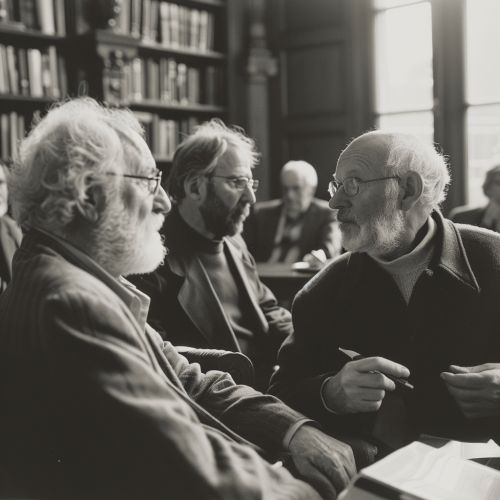Skepticism
Historical Overview
Skepticism, as a philosophical school of thought, has a rich and varied history, tracing its roots back to ancient Greece. The term itself is derived from the Greek word "skeptikoi", which translates to "seekers" or "inquirers". The earliest proponents of skepticism were the Pyrrhonists, who advocated for the suspension of judgment (epoché) as a means to attain ataraxia, or tranquility. This was followed by the rise of Academic Skepticism, a philosophical movement that emerged in Plato's Academy and was characterized by its doubt towards the possibility of certain knowledge.


The Middle Ages saw a decline in skeptical thought, largely due to the dominance of religious dogma. However, the Renaissance period witnessed a resurgence of skepticism, with thinkers like Michel de Montaigne and Francisco Sanches questioning the certainty of human knowledge. This period also saw the development of religious skepticism, with figures like Martin Luther and John Calvin challenging the authority of the Catholic Church.
The Enlightenment period marked a significant shift in the nature of skepticism. Philosophers like David Hume and Immanuel Kant applied skeptical principles to the study of human perception and understanding, leading to the development of empirical skepticism. This form of skepticism emphasizes the role of experience and evidence in the formation of knowledge, rejecting the notion of innate ideas or a priori knowledge.
In the 20th century, skepticism took on new forms and was applied to various fields of study. Logical positivism, for instance, applied skeptical principles to the study of language and meaning, while scientific skepticism emphasized the importance of empirical evidence and the scientific method in the pursuit of knowledge.
Philosophical Skepticism
Philosophical skepticism is a systematic approach that questions the reliability of our knowledge claims. It is characterized by its refusal to accept claims without sufficient evidence, and its insistence on the rigorous examination of all beliefs. There are several forms of philosophical skepticism, each with its own unique approach and focus.


Pyrrhonian Skepticism
Pyrrhonian skepticism, named after its founder Pyrrho, is characterized by its commitment to suspend judgment about all beliefs. Pyrrhonists argue that for any claim, there is always a counter-argument that is equally convincing. As such, the only rational response is to suspend judgment and refrain from making any knowledge claims.
Academic Skepticism
Academic skepticism, which emerged in Plato's Academy, is characterized by its doubt about the possibility of certain knowledge. Academic skeptics argue that our senses are unreliable and that our reasoning abilities are prone to error. As such, they maintain that we can never achieve certainty in our knowledge claims.
Cartesian Skepticism
Cartesian skepticism, named after René Descartes, is characterized by its method of systematic doubt. Descartes argued that in order to establish a firm foundation for science, we must first doubt all of our beliefs and only accept those that can withstand rigorous scrutiny.
Scientific Skepticism
Scientific skepticism applies the principles of skepticism to the realm of science. It emphasizes the importance of empirical evidence, the scientific method, and critical thinking in the pursuit of knowledge. Scientific skeptics question the validity of claims that lack empirical support, and they challenge the reliability of anecdotal evidence, personal testimony, and authority as sources of knowledge.


Scientific skepticism is closely associated with the philosophy of science, as it shares its commitment to empirical evidence and its rejection of metaphysical claims. It also plays a crucial role in the practice of science, as it encourages scientists to question their assumptions, to scrutinize their methods, and to remain open to new ideas and evidence.
Skepticism in Other Fields
Skepticism has also been applied to various other fields of study, including religion, ethics, politics, and the social sciences.
Religious Skepticism
Religious skepticism involves questioning the validity of religious beliefs and practices. This can range from doubting specific religious claims, to rejecting the existence of a supernatural realm, to denying the possibility of religious knowledge altogether.
Ethical Skepticism
Ethical skepticism questions the possibility of moral knowledge. Ethical skeptics argue that moral beliefs are subjective and culturally relative, and that there are no objective moral truths that we can discover.
Political Skepticism
Political skepticism involves questioning the legitimacy of political institutions and practices. Political skeptics may doubt the efficacy of political systems, the validity of political ideologies, or the integrity of political leaders.
Social Skepticism
Social skepticism applies skeptical principles to the study of society and culture. Social skeptics question the validity of social norms, cultural practices, and societal institutions.
